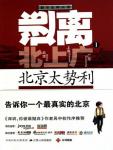Chapter 1 Recommended Preface Beishangguang, Who Are You Abandoning?
Lieutenant Colonel Hu
It was November when I saw this set of "Escape from Beijing, Shanghai and Guangzhou". At this time 8 years ago, when I was young and frivolous, I wrote "Shenzhen, Who Abandoned You", which came to the forefront overnight.
In the past 8 years, Shenzhen has gone from the situation of "who are you abandoning" to the "state" of "who are you abandoning".Similarly, Beijing, Shanghai, and Guangzhou are becoming more and more critical and demanding in the rapid urbanization of China.
After "Shenzhen, Who Abandoned You", for myself, one of the next topics I particularly want to write is "Escape from Beijing, Shanghai and Guangzhou".If the Shenzhen issue at that time was only a local phenomenon with certain particularities, then the current Beijing, Shanghai, and Guangzhou issues are closely related to almost every young Chinese in China, and it is also a part of China’s rapid urbanization and industrialization. The inevitable confusion and dissociation, the interpretation of this question, I think, is not just a matter of the three regions of Beijing, Shanghai and Guangzhou, nor is it just an answer to the recent phenomenon of fleeing.
When I was interviewed by the media 3 years ago, I had this opinion: "Migrant workers and college students who have just come to Shenzhen to work for three or four years are the main body of 'escaping from Shenzhen'. The issue of housing prices, household registration policies, and social insurance issues, this is The three biggest problems in Shenzhen in recent years. At present, housing prices in Shenzhen are soaring, which has a 'crowding out effect' on outsiders. Once income decreases, expenditure increases, and the household registration system is added, it is easy for people to leave."
Right now, this trend appears to be intensifying.
Although Beijing, Shanghai, and Guangzhou have their own characteristics, the reality is hard and bitter.
The "escape" mentioned by the author of this set of books is not an escape, nor is it a simple comparison of living costs between first-tier and second-tier cities. I understand that it is more a reflection of a collective emotion and way of thinking.This is precisely the keen point of the author, today's "emotion" is tomorrow's "action".So in my opinion, this book is not only of great benefit to young friends who are hesitating in "Beijing, Shanghai, Guangzhou" and want to go to "Beijing, Shanghai, Guangzhou" to realize their dreams, but also worthy of careful study by city leaders.
Coincidentally, the author of "Escape from Beijing, Shanghai and Guangzhou Series" is almost the same age as I was when I wrote "Shenzhen, Who Abandoned You", and the struggle process is almost the same as mine.Back then, "Shenzhen, Who Are You Abandoned" led to a big discussion about the fate of Shenzhen. It is hard to guarantee that "Escape from Beijing, Shanghai and Guangzhou" ("Beijing is too snobbish", "Shanghai is too expensive", "Guangdong is too competitive") will not trigger the whole country. There is a new round of discussion on the process of urbanization. The good news is that China now has enough rationality and wisdom to think about similar issues.
November 2010
Note: Lieutenant Colonel Hu, born in Hubei in 1975, graduated from Wuhan University. In November 2002, under the screen name "I'm crazy about Iraq", he published the 4D article "Shenzhen, Who Are You Abandoned" on the forums of People's Daily Online and Xinhuanet, which caused a sensation in the whole country and sparked the whole society's concern about the future of the Special Economic Zone. Great discussion. In January 2003, the then mayor of Shenzhen met Lieutenant Colonel Kuan and had an open dialogue, which was the first time in China.Afterwards, Lieutenant Colonel Kui further elaborated on his ideas and wrote a 200,000-word monograph based on the original text, which became a popular and well-received bestseller.Currently working for Hong Kong "Asia Weekly".

